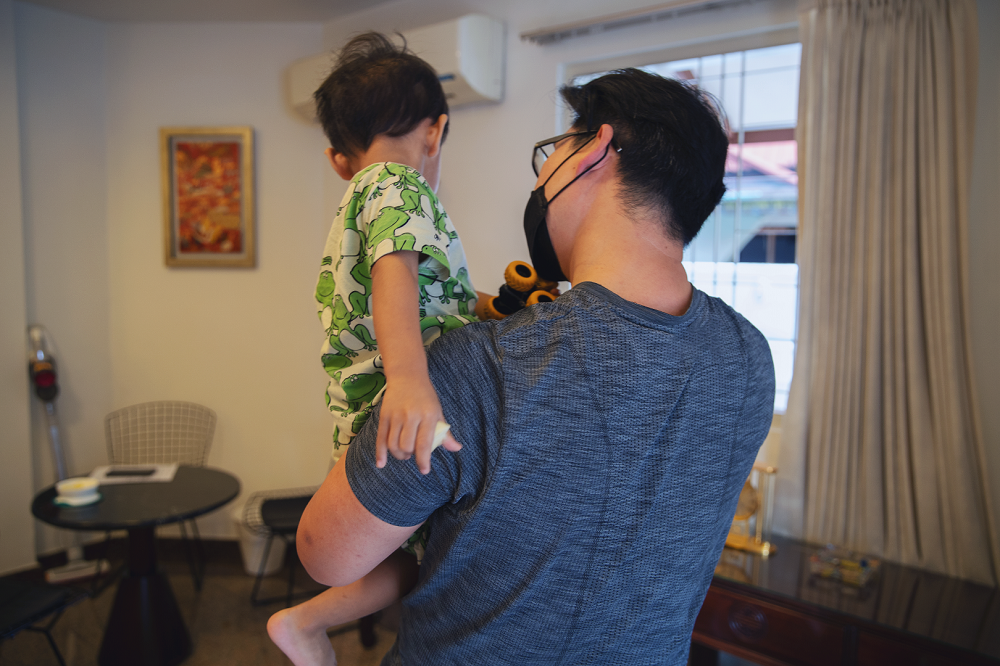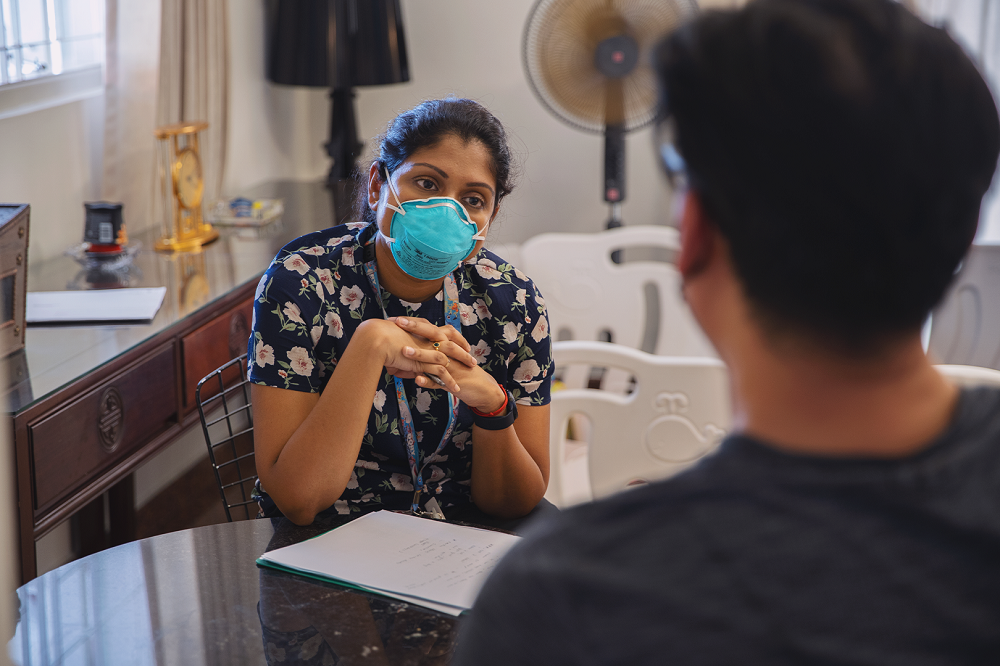Anchored in Support: Early Intervention for Better Beginnings
29 Nov 2021She rings the bell along the common corridor and waits. The door of the HDB unit swings open, and she looks down to greet the children who have rushed to meet her with a welcoming “hello!”
Bavani D/O Govindarasu is a regular visitor to the home. The children get to enjoy stories and interactive activities whenever she comes by, while their caregivers speak to her on matters regarding their children’s development, behaviour and health.
With a cumulative experience of 13 years as a nurse and community health visitor, Bavani is currently a senior community health visitor with the Anchor programme at KK Women’s and Children’s Hospital (KKH).
Developed through a collaboration between Temasek Foundation and KKH, the Anchor programme is supported by various community agencies. The pilot programme provides holistic support and coordination of care for children aged 0 to 3 years who have been exposed to challenging circumstances or traumatic events, and their caregivers.
.png?sfvrsn=48b81c99_1)
Home visits are an integral part of the Anchor programme model, where Community Health Visitors like Bavani (centre) provides follow-up care, assessment and/or intervention for children from vulnerable families.
“One of the children whom I was following up on had a history of maltreatment and was placed in a foster home. The child had been taking care of himself for long periods of time and took some time to adapt to having foster parents,” shared Bavani.
“We imparted behaviour management and positive parenting strategies to his caregivers. Now, they follow these strategies and know what to look out for to help the child in his overall development, as well as how to tactfully handle his behaviour and establish routines.”
When a child is referred to the Anchor programme, KKH conducts a comprehensive evaluation of both the child and their family. This includes the child’s development, behaviour and health, as well as the primary caregiver’s mental health and the family’s financial or other needs. The evaluation enables the Anchor programme team to identify needs early, and coordinate support services within the hospital, as well as in the community.
With the information, the team will also plan for home visitations and interventions, carried out by Community Health Visitors like Bavani, who are supported by doctors, psychologists and medical social workers. Besides working directly with parents and children, the Anchor programme also helps to upskill community agencies with knowledge in child development and trauma management for young children.

Holistic support is provided for children aged zero to 3 years who have been exposed to adversities and are at a high risk of developmental, behavioural and health problems.
Woon Saet Nyoon, Chief Executive of Temasek Foundation Cares, said: “When children experience adverse experiences, the trauma may stay with them and affect them throughout their lives. With the Temasek Foundation Anchor programme, these children and their parents or caregivers receive holistic care in the community to reduce their exposure to negative experiences and support them in their development.”
One of these beneficiaries was Grace*, who was in an abusive marriage and was potentially experiencing postnatal depression. At the lowest point, she had a Personal Protection Order against her spouse and moved back to her parents’ home.
“As a first-time mum, I was emotionally distressed. My child seemed to be slightly delayed in her development and I didn’t know what to do,” said Grace. “During the home visits, the Community Health Visitor would check on my child's development and give me advice on how to take care of her. She has also been very supportive and hears me out during the home visits. I feel safe chatting with her.”
Grace and her spouse are currently attending counselling sessions and she has moved back to her matrimonial home. With support from the Anchor programme, she now knows what to do to keep both her and her child safe.
“I am more aware of my own emotional needs, and have learned to first take care of myself so that I can better care for my baby. I am really thankful for the emotional support given.”

In addition to parenting strategies, Community Health Visitors also look out for the health and concerns of the caregiver and family members.
Between November 2019 and May 2021, the Anchor programme supported 174 beneficiaries like Grace, including 87 enrolled with the home visitation programme. It is expected to directly benefit 120 at-risk children between 0 to 3 years old in the pilot phase.
“Our one-to-one work with caregivers and the child is helpful in providing targeted interventions for them, according to what they need. We are seeing improvements in early child development, including social-emotional development and parent-child relationships; families have shared that they are better able to promote their child’s development, manage their behaviour and are more aware of their child’s needs,” shared Dr Padmini Yeleswarapu, Senior Consultant in the Department of Child Development and the Lead for the Anchor programme at KKH.

Children and caregivers who are enrolled in the Anchor programme receive multi-disciplinary care from doctors, psychologists and medical social workers, and may sometimes be referred to supportive services in the community.
Jane*, an Anchor beneficiary who had been in a conflictual relationship, has a two-year-old who currently exhibits behavioural and developmental issues not uncommon with children exposed to adversities. The situation has improved with intervention and guidance from her Community Health Visitor.
She shared specific techniques that she picked up: “The Community Health Visitor gave me tips on how to talk to my daughter, for example, to use some suggested words to speak with her instead of baby talk. The assessments done during the home visits also helped me understand if my child was developing well, in areas like motor skills and how she interacted with others.”
Community Health Visitors do more than provide developmental support. At times, they offer a listening ear and a shoulder to lean on. “The Anchor programme provided me with much support especially when my child was fostered out. I was able to seek help from my Community Health Visitor.
“She gave me the moral support I needed.”
*To protect their privacy, the names of beneficiaries have been changed.
If you know someone who would be interested to learn more about the Anchor programme, or reach out to the team, please visit: https://www.kkh.com.sg/patient-care/areas-of-care/childrens-services/Pages/Anchor.aspx